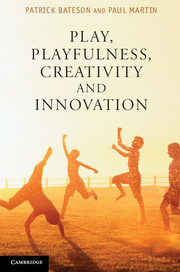Book contents
- Frontmatter
- Contents
- Advance praise
- Preface
- Acknowledgements
- 1 Introduction
- 2 The biology of play
- 3 The functions of play
- 4 Evolution and play
- 5 Creativity in humans
- 6 Animals finding novel solutions
- 7 People and organisations
- 8 Childhood play and creativity
- 9 Humour and playfulness
- 10 Dreams, drugs and creativity
- 11 Pulling the threads together
- Notes
- References
- Index
7 - People and organisations
Published online by Cambridge University Press: 05 July 2013
- Frontmatter
- Contents
- Advance praise
- Preface
- Acknowledgements
- 1 Introduction
- 2 The biology of play
- 3 The functions of play
- 4 Evolution and play
- 5 Creativity in humans
- 6 Animals finding novel solutions
- 7 People and organisations
- 8 Childhood play and creativity
- 9 Humour and playfulness
- 10 Dreams, drugs and creativity
- 11 Pulling the threads together
- Notes
- References
- Index
Summary
We have argued from biological evidence that experiences gained during play can be used later in life and put together in novel ways to solve new problems. Play experiences may also lead immediately to the discovery of new ways of doing things. At the heart of play is the pleasure of engaging in the activity or thought process for its own sake, without any extrinsic reward. Even so, the creativity fostered by play can bring its own rewards. These will be intrinsic, but the rewards may also be material if creativity leads to successful innovation that benefits the player and others. In this chapter we first examine how others have viewed the satisfaction that creativity brings and the conditions that are conducive to creativity in organisations. We then consider how prior opportunities for play can facilitate the discovery of new ideas. Once discovered, the process of translating new ideas into innovations involves different skills.
INDIVIDUAL CREATIVITY
The social psychologist and educationalist Graham Wallas (1926) described five stages of the creative process, from preparation, incubation, intimation and illumination through to verification. Preparation involves formulating the problem to be solved. Incubation involves pondering potential solutions, possibly over a long period of time. Intimation involves articulating ways in which the problem might be solved, and illumination and verification involve testing the possibilities. Like others before him, Wallas considered creativity to be a process that allows humans to adapt to their changing environment. Since his time, the concept of creativity has developed extensively.
- Type
- Chapter
- Information
- Play, Playfulness, Creativity and Innovation , pp. 77 - 88Publisher: Cambridge University PressPrint publication year: 2013



